AI in Pediatrics
Did you know that artificial intelligence has been shown to improve diagnostic accuracy in pediatrics by up to 30%? The integration of AI into pediatric healthcare is reshaping the landscape of medicine, offering innovative solutions to longstanding challenges. From early disease detection to personalized treatment plans, the potential benefits are vast. Discover how AI is transforming pediatric care and paving the way for a future where healthcare is more precise, efficient, and patient-centered.
Key Takeaways
- AI aids in early disease detection and personalized treatment plans for pediatric patients.
- AI improves diagnostic accuracy through image analysis and personalized care pathways.
- Remote monitoring solutions with AI enhance continuous evaluation and early intervention for pediatric patients.
- AI-assisted imaging technologies identify subtle abnormalities for early detection and improved patient outcomes.
- Virtual health assistants in pediatrics optimize healthcare delivery, enhance patient engagement, and provide immediate responses.
Early Disease Detection
Utilizing artificial intelligence can greatly enhance early disease detection in pediatric patients, allowing for prompt intervention and improved health outcomes. Health screenings powered by AI can analyze vast amounts of data quickly and accurately, identifying subtle patterns or indicators that may go unnoticed by human eyes. This advanced technology aids in the early identification of potential health issues, enabling healthcare providers to intervene proactively before conditions worsen.
Through AI-driven health screenings, disease prevention in children becomes more effective. By detecting conditions in their early stages, such as developmental delays or chronic illnesses, healthcare professionals can implement timely interventions and personalized treatment plans. This proactive approach not only improves the quality of care for pediatric patients but also reduces the burden on the healthcare system by preventing the progression of diseases that may require more extensive and costly interventions in the future.
Ultimately, AI plays an important role in promoting early disease detection and enhancing disease prevention strategies in pediatric healthcare.
Personalized Treatment Plans
When it comes to pediatric care, personalized treatment plans play a vital role in ensuring the best outcomes for young patients.
Tailored medical interventions based on individual needs can lead to more effective results and improved overall health.
Tailored Medical Interventions
Customizing medical interventions to meet the specific needs of pediatric patients can greatly enhance treatment outcomes and overall well-being. By integrating genetic counseling and AI algorithms, healthcare providers can tailor interventions based on a child's unique genetic makeup. This personalized approach guarantees that treatments aren't only effective but also minimize potential adverse reactions.
Moreover, utilizing preventive care strategies supported by machine learning techniques allows for early identification of health risks in children. AI algorithms can analyze vast amounts of data to predict potential health issues, enabling healthcare providers to intervene proactively. This proactive approach to healthcare can markedly improve outcomes for pediatric patients by addressing issues before they escalate.
Incorporating personalized medical interventions can revolutionize pediatric care by offering targeted treatments that consider each child's individual characteristics and needs. By harnessing the power of AI and genetic insights, healthcare professionals can provide more precise and effective care, ultimately enhancing the well-being of young patients.
Customized Care Pathways
Tailoring treatment plans to suit the unique needs of each pediatric patient is essential for optimizing healthcare outcomes and ensuring personalized care. By incorporating parental involvement in decision-making processes and utilizing advanced AI algorithms, healthcare providers can create customized care pathways that cater to the specific requirements of young patients.
Parental involvement is important as it allows caregivers to provide valuable insights into the child's medical history, preferences, and lifestyle, enabling a more holistic approach to treatment planning.
Care coordination plays a significant role in ensuring the seamless implementation of personalized treatment plans. AI algorithms can assist in streamlining care coordination efforts by analyzing vast amounts of data to identify the most effective interventions for individual pediatric cases.
Algorithm optimization enhances the precision and efficiency of treatment plans, leading to better health outcomes for children.
Individualized Treatment Strategies
Creating personalized treatment plans for pediatric patients involves understanding their unique medical needs and tailoring interventions to best suit their individual circumstances. Precision medicine plays an essential role in this process, utilizing predictive analytics to forecast potential outcomes based on a child's specific health profile. By tapping into the power of healthcare technology, practitioners can explore further into a patient's data, identifying patterns that inform personalized care pathways.
These individualized treatment strategies not only enhance patient outcomes but also contribute to a more efficient and effective healthcare system. Through the utilization of predictive analytics, healthcare providers can anticipate potential challenges, allowing for proactive interventions that mitigate risks and optimize results.
Improved Diagnosis Accuracy
When it comes to diagnosing pediatric patients, precision is key.
AI can greatly enhance diagnostic accuracy by assisting in image analysis and providing early detection capabilities.
Through these advancements, healthcare providers like yourself can offer more accurate and timely diagnoses, ultimately improving patient outcomes.
Diagnostic Precision Enhancement
Enhancing diagnostic precision in pediatrics through the integration of artificial intelligence has shown promising results in improving the accuracy of diagnoses.
AI-based interventions, such as predictive analytics, have revolutionized the way healthcare providers approach patient care. By analyzing vast amounts of patient data, AI can assist in identifying patterns and predicting potential outcomes, aiding in early detection and personalized treatment plans.
Critical advancements play a vital role in enhancing clinical decision-making processes. These algorithms can quickly sift through complex medical records, lab results, and imaging studies to provide healthcare professionals with valuable insights and recommendations.
Ai-Assisted Image Analysis
In addition, by utilizing artificial intelligence for image analysis, healthcare providers can greatly enhance the accuracy of pediatric diagnoses, leading to improved patient outcomes and more efficient treatment plans.
AI algorithms have revolutionized medical imaging enhancements, allowing for quicker and more precise identification of conditions in children. These algorithms can analyze large datasets of medical images with incredible speed and accuracy, assisting healthcare professionals in detecting subtle abnormalities that might be challenging to identify with the human eye alone.
The use of AI in image analysis can aid in the early detection of conditions such as tumors, fractures, infections, and developmental abnormalities. By providing healthcare providers with detailed insights and highlighting areas of concern, AI technology enables prompt intervention and tailored treatment strategies for pediatric patients.
Additionally, the enhanced accuracy in diagnosis achieved through AI-assisted image analysis reduces the likelihood of misdiagnoses, leading to better outcomes and improved overall healthcare quality for children.
Early Detection Capabilities
Utilizing artificial intelligence for early detection in pediatrics greatly enhances the accuracy of diagnoses, leading to improved patient outcomes and more efficient treatment plans. Machine learning algorithms and predictive analytics play a vital role in identifying subtle patterns and risk factors that may go unnoticed by human practitioners.
By analyzing vast amounts of data, AI can detect early signs of developmental delays, chronic conditions, or diseases, enabling healthcare providers to intervene proactively.
Early intervention facilitated by AI not only guarantees timely treatment but also promotes preventive care strategies. For instance, AI algorithms can predict the likelihood of certain conditions based on a child's medical history and genetic predispositions, prompting healthcare professionals to take preventive measures.
This proactive approach not only improves health outcomes but also reduces healthcare costs in the long run. By leveraging AI for early detection, pediatricians can tailor personalized care plans that address individual needs more effectively, ultimately enhancing the quality of care provided to young patients.
Remote Monitoring Solutions
Remote monitoring solutions offer a convenient way for healthcare providers to track patients' essential signs and health data in real-time, ensuring timely interventions and personalized care. In pediatrics, these solutions provide numerous benefits such as continuous monitoring, early detection of health issues, and reduced hospital visits. By utilizing AI algorithms, remote monitoring systems can analyze vast amounts of data quickly and accurately, aiding in the early identification of potential concerns.
Additionally, these solutions enhance pediatric patient engagement by involving families in the monitoring process and promoting active participation in their child's healthcare journey. Ensuring pediatric data privacy is paramount when utilizing remote monitoring solutions. Healthcare providers must adhere to strict regulations and implement robust security measures to safeguard sensitive information.
AI-assisted Pediatrics Imaging
In the field of pediatrics, AI-assisted imaging technologies have revolutionized the way healthcare providers analyze and interpret medical images to improve diagnostic accuracy and patient care. By harnessing the power of machine learning, these imaging technologies have greatly enhanced the process of AI diagnosis in pediatric care.
Imaging technology supported by AI can help identify subtle patterns or abnormalities in medical images that may be challenging for the human eye to detect. This advanced level of analysis not only aids in the early detection of conditions but also allows for more precise and personalized treatment plans for young patients.
Through the integration of AI in pediatrics imaging, healthcare providers can make more informed decisions, leading to improved outcomes and better overall patient care.
The ability of AI to assist in diagnosing conditions accurately and efficiently is transforming the landscape of pediatric healthcare, paving the way for enhanced diagnostic capabilities and ultimately, better health for children worldwide.
Enhanced Patient Outcomes
Patients benefit greatly from the integration of AI in pediatrics imaging, resulting in enhanced outcomes and improved quality of care. AI technology enables healthcare providers to offer remote monitoring services that allow for continuous evaluation of pediatric patients' conditions outside traditional clinical settings. Through remote monitoring, AI can track essential signs, medication adherence, and disease progression, providing real-time data to healthcare teams for prompt interventions.
Moreover, telemedicine solutions powered by AI facilitate virtual consultations, enabling easier access to specialized care for pediatric patients in underserved areas. These platforms allow pediatricians to remotely diagnose, monitor, and manage various conditions, reducing the need for in-person visits and minimizing healthcare disparities. By leveraging AI-driven telemedicine, healthcare providers can offer more personalized care plans, enhance patient engagement, and ultimately improve health outcomes for children.
Incorporating AI in pediatrics not only enhances patient outcomes but also revolutionizes the delivery of care, making healthcare more accessible, efficient, and patient-centered.
Virtual Health Assistants
Utilizing virtual health assistants in pediatrics introduces a valuable resource for enhancing patient engagement and optimizing healthcare delivery. Chatbot support, integrated into telehealth advancements, offers a convenient and accessible way for parents to seek guidance on their child's health concerns. These virtual assistants can provide immediate responses to common queries, offer basic medical advice, and even assist in scheduling appointments.
By incorporating chatbot support within telehealth platforms, healthcare providers can streamline communication with parents, allowing for quick updates on treatment plans or medication reminders. This real-time interaction fosters a sense of continuous care and support, enhancing the overall patient experience.
Virtual health assistants also play an important role in empowering parents to take an active role in managing their child's health. By providing reliable information and guidance, these chatbots contribute to informed decision-making and improved health outcomes for pediatric patients. Embracing this technology not only enhances efficiency in healthcare delivery but also strengthens the patient-provider relationship, ultimately benefiting the well-being of children.
Ethical Considerations
Given the significance of AI in pediatrics, it's essential to address the ethical considerations surrounding the use of virtual health assistants for children's healthcare needs. When it comes to utilizing AI in pediatrics, privacy concerns and data security are paramount.
As a parent or caregiver, you must consider the potential risks associated with sharing sensitive information about your child with virtual health assistants. While these AI tools offer convenience and accessibility, ensuring that your child's data is protected is essential.
Privacy concerns arise from the collection and storage of personal health information, raising questions about who's access to this data and how it's being used. Data security is another critical aspect to contemplate, as safeguarding your child's medical history and sensitive details from cyber threats is important.
It's essential to advocate for transparent policies regarding data handling and to choose virtual health assistants that prioritize robust security measures. By being mindful of these ethical considerations, you can navigate the world of AI in pediatrics responsibly and protect your child's privacy and data integrity.
Conclusion
As you consider the impact of AI in pediatrics, remember this: studies show that early disease detection through AI can increase survival rates by up to 30%.
This statistic highlights the pivotal role AI plays in improving pediatric healthcare outcomes. By embracing AI technologies, we can provide better personalized care, more accurate diagnoses, and enhanced monitoring solutions for our youngest patients.
Let's continue to harness the power of AI to revolutionize pediatric healthcare for the better.







